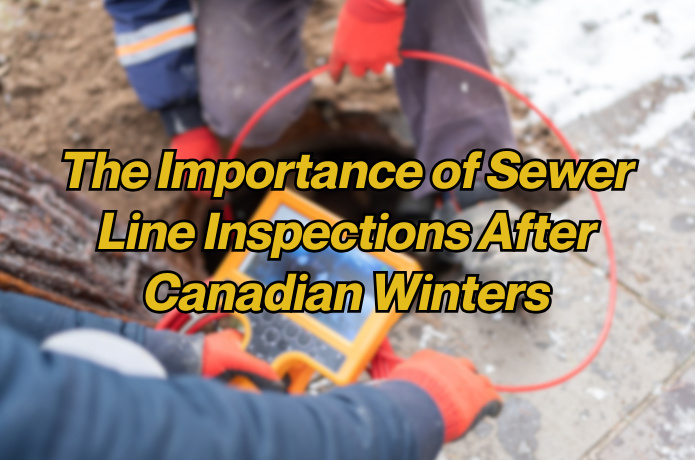The Importance of Sewer Line Inspections After Canadian Winters
The Importance of Sewer Line Inspections After Canadian Winters

Winter in Canada brings a unique set of challenges to homeowners, and one of the most commonly overlooked concerns is the condition of sewer lines. After the cold months, the freezing temperatures, heavy snowfalls, and shifting ground can cause serious damage to underground pipes. It’s crucial to understand how these seasonal changes affect your home’s plumbing and the importance of sewer line inspections to avoid costly repairs and long-term problems.
In Canada, winters can be harsh, with temperatures often dropping far below freezing. The freeze-thaw cycles and the weight of snow and ice can put pressure on sewer lines, leading to cracks, leaks, and blockages. Since sewer systems are buried underground, problems often go unnoticed until they cause significant damage. Regular sewer line inspections after winter are vital to detect issues early, ensure the proper functioning of the system, and maintain the overall health of your home’s plumbing.
The Effects of Freezing Temperatures on Sewer Lines
Frozen pipes are one of the most common issues homeowners face during Canadian winters. When water inside a pipe freezes, it expands, putting enormous pressure on the pipe. This expansion can cause pipes to crack or even burst, leading to water damage and costly repairs. In some cases, the freezing temperatures can also lead to blockages caused by ice inside the pipes, preventing wastewater from flowing properly. These issues are often not visible to homeowners, which is why it’s essential to schedule sewer line inspections as soon as the weather warms up.
Sewer lines that are located in areas with poor insulation or close to the surface are especially vulnerable to freezing. The freezing and thawing cycles throughout the winter can weaken the structural integrity of these pipes. Even if there are no visible cracks, the repeated stress on the pipes can lead to slow leaks that might not become apparent until months later. By having a sewer line inspection after winter, a professional can assess the condition of the pipes and identify any weak spots that might require repair or replacement before they lead to bigger problems.
Preventing Blockages and Clogs
Another critical reason for sewer line inspections after the winter months is to prevent blockages and clogs. During the cold season, debris such as leaves, snow, and ice can accumulate in sewer lines, creating blockages. As snow melts in the spring, the water can flow into these blockages, causing the debris to compact and harden, which can make the blockage worse. Over time, even small blockages can lead to severe plumbing issues like slow drainage, unpleasant odors, and sewage backups.
A professional sewer line inspection can help detect blockages early. By using specialized equipment, such as a sewer camera, a plumber can see inside the pipes and pinpoint exactly where the obstruction is located. Once identified, the blockage can be cleared using effective methods like hydro jetting, which uses high-pressure water to flush out debris without causing damage to the pipes. Regular inspections help ensure that your sewer system is clear and functioning efficiently, preventing the need for more costly repairs or replacements later on.
Identifying Cracks and Leaks in Pipes
The harsh winter conditions in Canada can lead to cracks and leaks in sewer lines. As mentioned earlier, the freezing and thawing process can weaken pipes over time. Even if the pipes don’t burst, they may develop small cracks that allow water to leak out. These leaks may go unnoticed for a while, but they can eventually cause significant damage to your property. Leaking sewer pipes can lead to water pooling in your yard, which can cause soil erosion, damage to landscaping, and even foundation problems.
Sewer line inspections are the best way to identify cracks and leaks before they become major issues. A plumber can use a specialized camera to inspect the interior of the pipes and detect any cracks or damage that could lead to leaks. If any damage is found, the necessary repairs can be made to prevent further water damage. Early detection is key to preventing expensive repairs and maintaining the overall health of your home’s plumbing system.
Protecting Your Home’s Value
Sewer line inspections are not only essential for preventing damage but also for protecting the value of your home. A well-maintained sewer system adds to the overall value of your property and ensures that you don’t face costly repairs in the future. On the other hand, if sewer line issues go unnoticed, they can result in significant damage to your home’s foundation, landscaping, and other structural elements. This can decrease the value of your property and make it more difficult to sell in the future.
Having regular sewer line inspections is a smart investment for homeowners who want to protect their property and avoid unexpected expenses. If you’re planning to sell your home in the future, having a recent sewer inspection report can give potential buyers peace of mind, knowing that the plumbing system is in good condition. It can also make the sale process smoother by addressing any issues before they become a point of negotiation.
In conclusion, sewer line inspections after Canadian winters are a crucial part of home maintenance. Freezing temperatures, snow, and the freeze-thaw cycle can all have a significant impact on the condition of your pipes. Early detection of issues like cracks, blockages, and leaks can save you money, prevent damage to your property, and ensure that your home’s plumbing system functions efficiently. Don’t wait for problems to arise—schedule a sewer line inspection as soon as the weather warms up to keep your home safe and protected. By investing in regular inspections, you can ensure the long-term health of your plumbing system and avoid costly repairs down the road.

